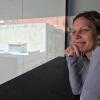Abstract
Learning in real world settings is highly complex. Individual learners are not only influenced by feedback, but also multiple aspects of their state, genetics, epigenetics, age, and accumulation of past experience. I will discuss two projects from our lab which seek to unpack this complexity in mice and potentially translate it back to human learning. The first is a study of developmental food insecurity that examines the effect of developmental experience x probability schedule of reward on cognitive flexibility in B6 mice (Lin et al. 2022). The second is a study of the effect of two different autism risk genes x probability schedule of reward on reinforcement learning (also in mice) (Chase et al., unpublished). In both projects, we find that group differences in learning are observed on some probability schedules but not others, highlighting the state dependent nature of the neurobiological differences and potential convergence. I will discuss our ongoing efforts to study the mechanisms underlying these contrasts, as well as the potential utility of these observations in translational work.
Biography
Linda Wilbrecht is Professor of Psychology and Neuroscience at the University of California, Berkeley and a member of the US National Scientific Council on Adolescence and the Brain Initiative U19 Team DOPE. The Wilbrecht Lab studies the basal ganglia, learning, decision making, and adolescent brain development. Current lab projects are funded by NINDS, NIMH, NIDA and Simons SFARI foundation.
